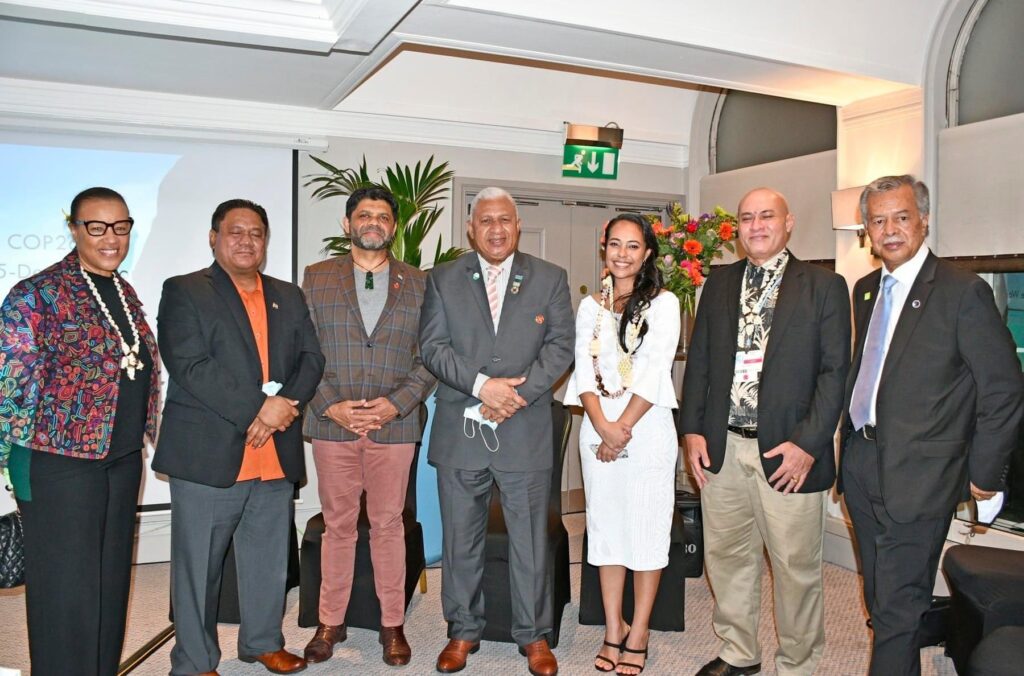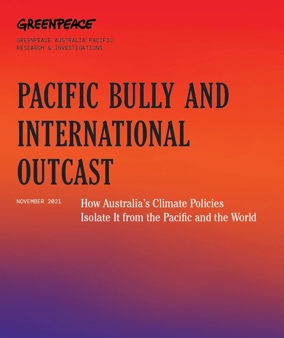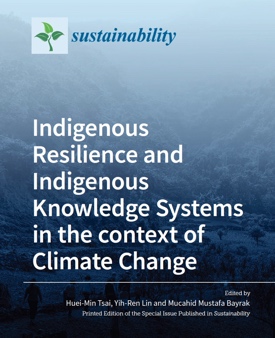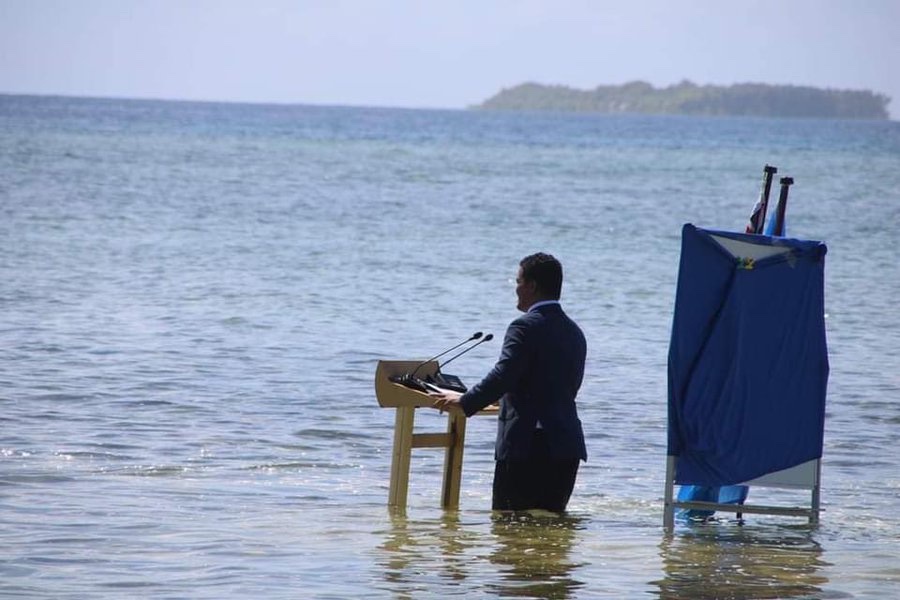
During the recent Australian federal election campaign, the then opposition leader – now prime minister – Anthony Albanese vowed to ‘end the climate wars’. Post-election, the energy crisis has made this promise more difficult to realise. But, as Steve Sharp writes in the first of a six-part series, so too will Pacific climate diplomacy which thrives on a ‘politics of distraction’ and diverts attention from homegrown environmental problems in the islands.
Diplomatically speaking, the current federal transition in Australia has a distinctly ‘Pacific’ focus. As shuttle diplomacy to and from the islands intensifies, we will learn more about how Australian foreign policy intersects with Pacific climate diplomacy.
It’s worth recalling the very recent history of global negotiations where PICs and Australia were in different lanes. During last November’s climate change conference in Glasgow – known as COP26 – Pacific climate activists focused intense diplomatic efforts towards securing global commitments to ambitious emission reduction targets.
The final pact, however, agreed to ‘phase down’ not ‘phase out’ coal, on the insistence of India backed by China, who produce and consume more coal than any other countries. Delegates’ reactions ranged from disappointed with the final agreement to not completely despairing of reaching the Paris Agreement 1.5 degrees target by 2050.
Even so, it was still a remarkable achievement to have different layers of Pacific societies – from senior officials and politicians to grassroots networks – united in collective strength against much larger diplomatic players. Ironic too that back in the islands, their own political community – the Pacific Islands Forum – was shedding members and was by-passed during the recent security intervention following Honiara’s latest riots last November.
The Glasgow campaign drew on its extensive alliances with small island states worldwide and networks of sympathetic activists in larger nations, including those in Australia who, as the high-stakes international summit approached, helped keep the campaign focused on this country’s ‘lack of ambition’.
There’s no denying the attention on Australia is well deserved as Pacific Island states, led by Fiji, have built their lobbying in recent years to target industrialised nations in general and Australia in particular. Increasingly, the regional security agenda is seen through the lens of ‘climate security’.
Climate security has become emblematic of small island states and has been wielded by Pacific leaders, diplomats and activists based on the premise that big-emitting, wealthier nations have a responsibility to pay for past damage that has disproportionately impacted island states whose own emissions are by comparison negligible.
The focus on Australia as a ‘climate laggard’ saw indictments coming from both high-level officials and activists from the Pacific. One official even called this lack of ambition a ‘declaration of war’. Throw in the well-timed release of a Greenpeace report entitled ‘Pacific Bully and International Outcast’ and the planets aligned for maximum international embarrassment.


But can we expect a cease fire now that the new government has promised to strengthen targets and embarked on its own climate diplomacy in the Pacific, fused as it is with its geopolitical positioning vis-à-vis China? Don’t count on it.
Part of the reason is how climate policy is communicated. Public diplomacy in general simplifies issues, as was the case in Glasgow, by focusing tightly on targets. Targets are promises of future action by governments expressed as numbers. In our own region, this can distract us from the destruction of Pacific environments that is occurring right now, regardless of what governments are promising. There is climate action and there is climate politics.
The Glasgow discourse – with its focus on targets and finance – diverts attention from a clear-eyed appraisal of short and medium-term trends in Pacific nations themselves. While Pacific diplomats are climate warriors abroad, their leadership at home falls short of their own high ambitions for environmental stewardship.
An example from Fiji makes this point. The global status of Pacific climate diplomacy was elevated in 2017 when Fiji assumed the presidency of COP23. Two years later, Fiji – led by its prime minister Frank Bainimarama whose 2006 military takeover led to Fiji’s expulsion for the Pacific Islands Forum – returned to the Forum and addressed the annual meeting in Tuvalu:
‘Standing shoulder to shoulder, Fiji, Tuvalu and our Pacific Island neighbours intend to do everything humanly possible to get the world to take the decisive action needed to save low-lying atolls like Tuvalu from the rising sea levels and extreme weather events associated with climate change,’ he promised his Pacific audience. ‘But if…that effort fails because the industrial nations continue to selfishly put their own interests above our own, Fiji will offer a home to you – the people of Tuvalu. We have made the same offer to your neighbours in Kiribati.’
This magnaminous, pan-Pacific gesture alluded to the ticking time-bomb of environmental refugees. The reference is to a decision made five year earlier by then President of Kiribati, Anote Tong for the micro-state to purchase a large parcel of land on Fiji’s second largest island, purportedly to re-settle at some future date i-Kiribati fleeing rising sea levels. In international climate circles, Tong has long been a revered figure whose international advocacy was mythologised in the documentary Anote’s Ark.
While the leaders of Fiji and Kiribati stood shoulder-to-shoulder, the downstream effects of their historic land deal have over time become divisive, effects that could have been foreseen. During colonial times, the land was alienated from its indigenous landowners and ended up in the hands of the Anglican Church. Landowners continue to lay claim to it, including that part of it settled by descendants of Solomon Islanders who were used as indentured labourers in the nineteenth century. Imagine the shock of the settlers who believed their tenure was secure when told the land on which they had resided since 1957 had been sold from under them to a foreign government.
Add to this the fear aroused early last year, when the new foreign owner announced it will use the land for commercial agriculture with assistance from another foreign government – the People’s Republic of China.
‘‘Developing’ it would exacerbate the current difficulties already experienced by the people of Naviavia,’ commented Paulo Baleinakorodawa of Transcend Oceania about the community on Vanua Levu. ‘It certainly will become a major driver of conflicts in this locality where there is a multi-layered set of actors and interests.’
The Republic of Kiribati, for so long emblematic of Pacific unity on climate, in April last year terminated its membership of the Pacific Islands Forum, along with four other Micronesian nations over the failure of the body to elect their preferred secretary-general. Although their president had in 2018 stood arm-in-arm with Melanesian and Polynesian members to declare climate change ‘the greatest single threat’, three years later, the threat, it seems, was not existential enough to prevent it walking away from 50 years of regional solidarity.
And just as Pacific delegations were presenting their final arguments in Glasgow, the same government announced it was removing protections for a 400,000 sq km species-rich, marine sanctuary – the Phoenix Islands Protected Area (PIPA) – which has been off-limits to fishing since 2015.

Micro-states in the Pacific and elsewhere have provided compelling visual narratives to planetary campaigns selectively targeting ‘big polluters’, but less so ocean plunderers. This requires them to present themselves as disproportionate victims of climate change. At the same time, they are capable of making sovereign decisions in their national interest, and in the case of PIPA, with some scientific backing.
Kiribati’s economy is dependent on fishing licences just as Australia’s economy is dependent on fossil fuel exports. It’s the same dilemma. Altering these structural dependencies will require much more clever action than clever politics to end the climate wars.
It could start with a deeper look at how Pacific climate activism – unwittingly or not – diverts attention from ongoing and unaddressed social and environmental problems that exist across the Pacific right now, mostly unrelated as they are to the action or inaction of governments outside the region.
This is the first of a six-part series entitled ‘The Politics of Distraction: how Pacific climate activism abroad obscures environmental damage at home’.
